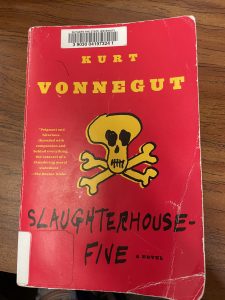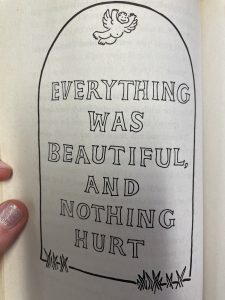 I picked up Slaughterhouse Five to read a passage for the Rutgers Banned Books virtual event. Little did I know that this fun side-project would contribute to my academic papers this semester! Sometimes a good book seeps into the other areas of our lives. Much of the time, I pick up a book because it is relevant to my current projects or long-term curiosities. This was not one of those times. I remembered reading this book as a tenth grader and remarking at the strange references to sexual acts (bestiality had not made an appearance in our curriculum) as well as the overt parody of war. Steeped in anti-military-industrial-complex philosophy via my mentor and violin teacher, I was aware that the book’s material would resonate with my understanding of the world. One of my favorite passages is the description of watching a war film in reverse:
I picked up Slaughterhouse Five to read a passage for the Rutgers Banned Books virtual event. Little did I know that this fun side-project would contribute to my academic papers this semester! Sometimes a good book seeps into the other areas of our lives. Much of the time, I pick up a book because it is relevant to my current projects or long-term curiosities. This was not one of those times. I remembered reading this book as a tenth grader and remarking at the strange references to sexual acts (bestiality had not made an appearance in our curriculum) as well as the overt parody of war. Steeped in anti-military-industrial-complex philosophy via my mentor and violin teacher, I was aware that the book’s material would resonate with my understanding of the world. One of my favorite passages is the description of watching a war film in reverse:
“When the bombers got back to their base, the steel cylinders were taken from the racks and shipped back to the United States of America, where factories were operation night and day, dismantling the cylinders, separating the dangerous contents into minerals. Touchingly, it was mainly women who did this work. The minerals were then shipped to specialists in remote areas. It was their business to put them into the ground, to hide them cleverly, so they would never hurt anybody ever again.” (p. 94)
Reading these books in high school may have been aimed at letting students engage with complex ideas (ironies, non-linear events) and challenging events (death, war, etc. …). I acknowledge how lucky I was to have been given the freedom to read ––something not to be taken for granted. Since I first read this book, many more people have died from war and some aspects of modern society seem to be going nowhere or backwards. If not for fiction to engage with difficult realities, I suspect that I would be more ill-equipped to “handle” it all. (We also know that that’s a fallacy as well …) However, according to the Tralfamadorian philosophy, one should just remember the the nice parts of life:
 “But you do have a peaceful planet here.”
“But you do have a peaceful planet here.”
“Today we do. On other days we have wars as horrible as any you’ve ever seen or read about. There isn’t anything we can do about them, so we simply don’t look at them. We ignore them. We spend eternity looking at pleasant moments- like today at the zoo. Isn’t this a nice moment?”
“Yes.”
“That’s one thing Earthlings might learn to do, if they tried hard enough: Ignore the awful times, and concentrate on the good ones.” (p. 150)
This time around, I ended up listening to the book on Audible, narrated by James Franco. Life is a lot different from when I curled up on the couch and read my books after high school. In order to find time to enjoy this book and save my eyes, I listened to the audiobook during runs around my neighborhood or while driving back from visiting family on the weekends. However, I’m glad that I read the book in my own voice the first time around. Franco’s delivery is well crafted and effective, but restricts some of the room for imagination through inflection and emphasis.
Regardless of the mode of consumption, the story leaked into my academic work. I ended up writing a midterm paper on the concept of the postmodern sublime in Beethoven’s 9th Symphony. As I familiarized myself with the postmodern tradition, I casually wondered if Vonnegut fit the description. Given that postmodernism loves devices of irony, non-linear stories, metafiction and disenchantment with society, I was reading this book right on schedule. This was more than a passing case of confirmation bias. For better or worse, I ended up quoting the Tralfamadorians in my paper.
Recreational reading has the power to infiltrate our work, leading to more creative products. This freshness of process and inspiration can sometimes even make the work easier. (Check out Sherri Farber’s guide and video on the ups and downs of the research process here.) Even if you “don’t have time,” make time. Following your curiosity through recreational reading can lead to unexpected conclusions in academic projects.
Recommended Reading: